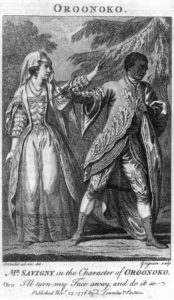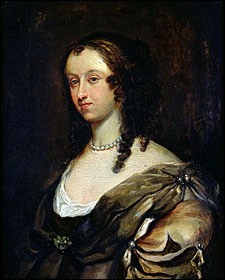Hello again, class.

Depiction of the 1776 performance of Oroonoko: or, the Royal Slave
After reading Daniel Defoe’s Robinson Crusoe—and heavily criticizing its racism—I wondered if it was a worthy candidate for the 50-books list at all. For many reasons, I think it isn’t one of the books everyone has to read before they die, despite its importance. There are better books out there—the one I have in mind, in fact, treats the subject of race with more respect and accomplished the feat 30 years before Robinson Crusoe graced the page.
Oroonoko: or, the Royal Slave, written by Aphra Behn in the late 17th century, has a similar style to Robinson Crusoe, but tells a stronger (and very different) story. Oroonoko is a royal man from an African tribe, who was sold into slavery and thrown into the world of “civilization.” He defends his love, Imoinda, both in Africa and in this new environment, and when he tries to lead a rebellion, he is captured and brutally executed . . . one of the most distressing and terrifying executions I’ve seen from any story.
It can be hard to read, but it deserves to be on the list.
Historically speaking, Oroonoko is one of the earliest English novels, and one of the first novels ever to advocate against slavery. Aphra Behn is one of the earliest well-known female writers, and while Oroonoko was only considered a literary masterpiece long after Behn was gone, it paved the way for feminism, anti-slavery, and political treatment of minorities.

Author Aphra Behn
But the story of Oroonoko is more about power in the face of slavery. Oroonoko has power within himself—maybe it stems from his royalty, or from his ownership of self, regardless of those that claim to own him. His power challenges his enslavement. He remains true to himself after everything that happens to him, no matter how his owners and torturers attack him. They can’t access his inner power.
That’s his freedom. He is free despite what they do to his body, to his people, to the ones he loves. For all he suffers, he never loses what gives him his power: himself.
As important as this plot is, it’s only the beginning. Aphra Behn’s writing is subtle and ingenious. The use of the narrator is complex for its time, and the political messages are far ahead of the game. It is a powerful and moving novel.
Author Virginia Woolf has said that Behn, who spoke her mind bravely, is the reason so many women since then have been able to do the same. That alone grants Oroonoko a spot on the list of books we should all read before we die.
I’m still reading A Bend in the River—which could have learned a bit from Oroonoko, but I’ll hold back judgement until I’ve finished it. I like it more than Robinson Crusoe, for whatever that’s worth. We’ll see what happens.
Until next week,
Prof. Jeffrey
Recent Comments